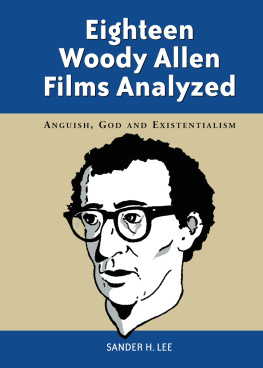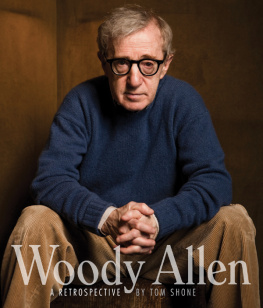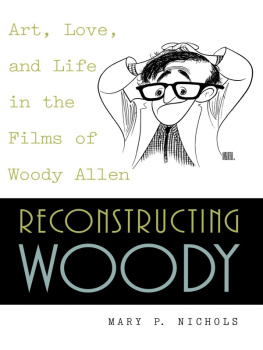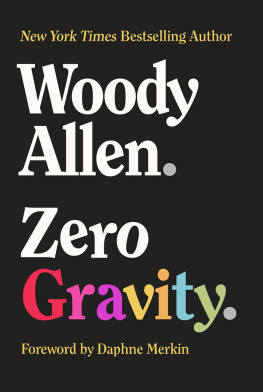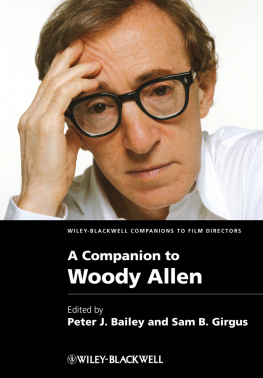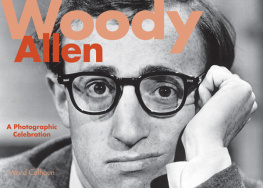Sander H. Lee - Eighteen Woody Allen Films Analyzed: Anguish, God and Existentialism
Here you can read online Sander H. Lee - Eighteen Woody Allen Films Analyzed: Anguish, God and Existentialism full text of the book (entire story) in english for free. Download pdf and epub, get meaning, cover and reviews about this ebook. year: 2014, publisher: McFarland, genre: Detective and thriller. Description of the work, (preface) as well as reviews are available. Best literature library LitArk.com created for fans of good reading and offers a wide selection of genres:
Romance novel
Science fiction
Adventure
Detective
Science
History
Home and family
Prose
Art
Politics
Computer
Non-fiction
Religion
Business
Children
Humor
Choose a favorite category and find really read worthwhile books. Enjoy immersion in the world of imagination, feel the emotions of the characters or learn something new for yourself, make an fascinating discovery.
- Book:Eighteen Woody Allen Films Analyzed: Anguish, God and Existentialism
- Author:
- Publisher:McFarland
- Genre:
- Year:2014
- Rating:5 / 5
- Favourites:Add to favourites
- Your mark:
- 100
- 1
- 2
- 3
- 4
- 5
Eighteen Woody Allen Films Analyzed: Anguish, God and Existentialism: summary, description and annotation
We offer to read an annotation, description, summary or preface (depends on what the author of the book "Eighteen Woody Allen Films Analyzed: Anguish, God and Existentialism" wrote himself). If you haven't found the necessary information about the book — write in the comments, we will try to find it.
Sander H. Lee: author's other books
Who wrote Eighteen Woody Allen Films Analyzed: Anguish, God and Existentialism? Find out the surname, the name of the author of the book and a list of all author's works by series.
Eighteen Woody Allen Films Analyzed: Anguish, God and Existentialism — read online for free the complete book (whole text) full work
Below is the text of the book, divided by pages. System saving the place of the last page read, allows you to conveniently read the book "Eighteen Woody Allen Films Analyzed: Anguish, God and Existentialism" online for free, without having to search again every time where you left off. Put a bookmark, and you can go to the page where you finished reading at any time.
Font size:
Interval:
Bookmark:

Sander H. Lee

McFarland & Company, Inc., Publishers
Jefferson, North Carolina
LIBRARY OF CONGRESS CATALOGUING DATA ARE AVAILABLE
BRITISH LIBRARY CATALOGUING DATA ARE AVAILABLE
e-ISBN: 978-0-7864-8110-1
2002 Sander H. Lee. All rights reserved
No part of this book may be reproduced or transmitted in any form or by any means, electronic or mechanical, including photocopying or recording, or by any information storage and retrieval system, without permission in writing from the publisher.
McFarland & Company, Inc., Publishers
Box 611, Jefferson, North Carolina 28640
www.mcfarlandpub.com
I wish to thank Keene State College for supporting me in countless ways during my work on this book. My thanks also to the following programs, institutions, and societies for their support of my work on this project: the American and International Societies for Value Inquiry, the Bergen Community College Philosophy Club, the Elderhostel program, the Keene Public Library, the Jasper and Marion Whiting Foundation, The Journal of Value Inquiry, the Mason Library of Keene State College, the New Hampshire Humanities Council, the Northern New England Philosophical Association, P. M. K. Publicists, the Society for the Philosophical Study of the Contemporary Visual Arts and its journal Film and Philosophy.
For their support, encouragement and suggestions, I am grateful to the following individuals and organizations: Woody Allen, Anne Ames, Suzy Berkowitz, Laura Castro, Jane Cullen, Debra Daigle, Leslee Dart, Kendall DAndrade, Nona Feinberg, Robert Ginsberg, Joram Haber, Nancy Haggarty, Mike Haines, Marion Koltie-Levine, Paul Lalibert, Mike Lee, Tony Lee, Tom Magnell, Anne-Marie Mallon, Rita Miller, Mary Nichols, Nancy Pogel, Chris Pratt, Keith Regan, Mark Roche, Alan Rosenberg, Grace Smith, Sanford Smith, Jean Whitcomb, John Vitale, Maurice Yacowar, and all my students. Special thanks go to Joan Norcross for her help in creating the books index.
I am grateful to Mike Lee, who created the art on the front cover.
Finally, thanks go again to my wife, Wendy, for her editing advice and for putting up with my mishegoss all these years.
Although Woody Allens films differ dramatically in content and tone, there are recurring themes that permeate his work. These themes reappear again and again, yet each time they are handled somewhat differently. Its as though Allen has engaged in a decades-long debate with himself, an ongoing dialectic in which he presents all sides of the arguments concerning the most profound philosophical issues. This book is a systematic analysis of these themes as they appear in a representative selection of Allens films including those that I consider to be his most influential.
The reader might wonder why I dont analyze all of Allens films rather than a mere eighteen. The answer is that I already have. In 1997, in the hardback book Woody Allens Angst: Philosophical Commentaries on his Serious Films, I presented detailed analyses of all thirty of Allens films to that date, from Whats New Pussycat? (1965) to Mighty Aphrodite (1995). Running to more than four hundred pages, that book examined Allens films in exhaustive detail, often engaging in scene by scene analyses of Allens most important films.
This book explores those same themes in a shorter format both in terms of the number of films examined and the degree of detail presented. It has two intended audiences: students in undergraduate courses and lay readers interested in Allens films who do not desire to immerse themselves in the comprehensive approach of the hardback. As a textbook, this edition might be used in a variety of contexts, including film courses that take a more theoretical approach and philosophy courses that use film to illustrate their content. Although the philosophers discussed in this volume range from Plato and Aristotle to Buber and Sartre, the emphasis here, as in Allens films, is on those philosophers usually associated with the movement known as existentialism.
Philosophers argue about everything, including labels like existentialism. Existentialism is a name given to a philosophical movement that became popular in the decades following World War II. The philosopher most associated with this movement was the Frenchman Jean-Paul Sartre. While Sartre may not have coined the term, he was well known for his willingness to describe himself as an existentialist.
In fact, in France and much of Europe, Sartre became as recognizable as a movie star or a sports hero. In the United States, the image of the gloomy existentialist, dressed all in black with a beard or goatee, drinking wine in a smoke-filled jazz club, became a clich on TV and in films. This image also became associated in peoples minds with the Beatniks of the 1950s.
For a classic example of this popular stereotype, take a look at the 1957 film Funny Face, in which a sophisticated Fred Astaire transforms Audrey Hepburn from an unhappy beat existentialist into a glamorous fashion model. This story was a variation on a theme found in an earlier film, the wonderful 1939 Ninotchka, in which a sophisticated Melvyn Douglas transforms Greta Garbo from a dour Communist functionary into a glamorous woman of the world. Indeed, for many, the popular images of the existentialist and the revolutionary Marxist blur together, partially because Sartre himself attempted to combine the two.
But Sartres atheistic approach is not the only philosophy that has been labeled as existential. In the wake of its postwar popularity, a number of commentators, such as Walter Kaufmann and William Barrett, made the argument that existentialism comprised a set of themes or concerns; and that, perhaps, a number of philosophers who wrote before Sartre, and had never even heard the word existentialism, could accurately be described as important influences on its development. Two of the philosophers often named in this connection are the nineteenth century theorists Sren Kierkegaard and Friedrich Nietzsche.
In addition, in their books on existentialism, these same commentators also included twentieth-century philosophers who may have heard of existentialism but either did not actively associate themselves with the movement or actually denied that their philosophy should be identified with it at all. For example, both Martin Heidegger and Albert Camus were very well aware of Sartres philosophy and publicly disassociated themselves from it. Yet, in Kaufmann and Barretts books on existentialism, and in many of those which followed, both Heidegger and Camus are discussed extensively in the context of existentialism, even though Kaufmann, for one, is careful to acknowledge that neither philosopher considered himself to actually be an existentialist.
Further, there are those philosophers of the twentieth century who were willing, or even eager, to accept the label of existentialist despite the fact that their philosophies would appear, on the face of them, to differ significantly from Sartre on important issues such as religious faith. In this group could be placed such contemporary religious philosophers as Martin Buber, Gabriel Marcel, Paul Tillich, and Joseph B. Soloveitchik.
Next pageFont size:
Interval:
Bookmark:
Similar books «Eighteen Woody Allen Films Analyzed: Anguish, God and Existentialism»
Look at similar books to Eighteen Woody Allen Films Analyzed: Anguish, God and Existentialism. We have selected literature similar in name and meaning in the hope of providing readers with more options to find new, interesting, not yet read works.
Discussion, reviews of the book Eighteen Woody Allen Films Analyzed: Anguish, God and Existentialism and just readers' own opinions. Leave your comments, write what you think about the work, its meaning or the main characters. Specify what exactly you liked and what you didn't like, and why you think so.

